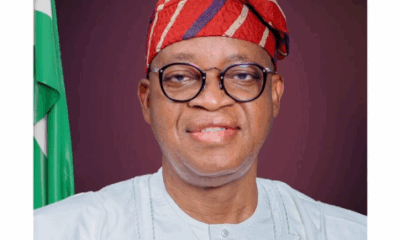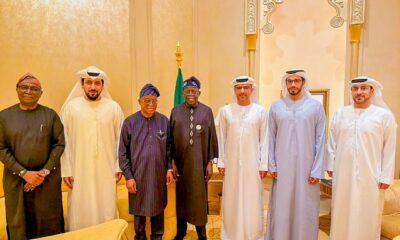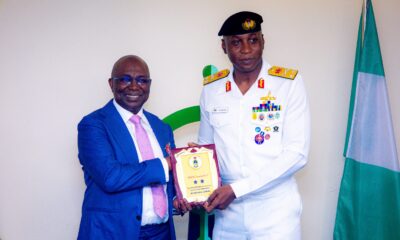Business
WMD 2025: NIMASA DG, Mobereola Explores Roadmap Towards Sustainable Ocean Stewardship

BY GBOGBOWA GBOWA
The Orchid and Lantana Hall at Eko Hotel & Suites buzzed with energy and purpose as Nigeria’s maritime elite gathered to mark World Maritime Day 2025. Under the theme “Our Ocean, Our Obligation, Our Opportunity,” the event served as a clarion call for sustainable ocean governance, with powerful goodwill messages delivered by Dr. Dayo Mobereola, Director General of the Nigerian Maritime Administration and Safety Agency (NIMASA).
Dr. Mobereola’s address underscored the ocean’s centrality to Nigeria’s economy and ecological future, he noted that over 80% of Nigeria’s trade flows through its waters as he emphasized the ocean’s role in climate regulation, biodiversity, and national security; framing it as a strategic asset that demands vigilant stewardship.
“Approximately 71% of the world’s surface is covered by oceans. According to the World Bank, the oceans provide a livelihood for nearly 3 billion people globally. Nigeria is blessed with a vast maritime endowment providing extensive opportunities for investment and growth.
“For us, the ocean is the lifeblood of our nation, the gateway for over 80% of our trade, and a reservoir of immense biodiversity and resources. Its health dictates our climate, its security defines our sovereignty, and its potential holds the key to our future”, Mobereola declared.
He spotlighted NIMASA’s commitment to environmental sustainability and maritime safety, citing initiatives like the Marine Litter and Plastic Action Plan and the implementation of IMO frameworks.
Speaking on maritime security, Mobereola hailed the Deep Blue Project, Nigeria’s integrated maritime security infrastructure, which he says is a transformative force in combating piracy and safeguarding the Gulf of Guinea.

“On the security front, we are delighted that the Deep Blue project (Nigeria’s Integrated Maritime Security Infrastructure) has become a game changer in addressing maritime security in Nigeria and the Gulf of Guinea Area”, he said..
While calling for equitable transition and private sector investment in the sector, Mobereola also addressed the global financing gap in ocean sustainability, referencing the World Bank’s estimate of a $150 billion annual shortfall in funding for SDG 14 (Life Below Water).
“Public funding alone will never be enough,” he warned, urging the private sector to step up through regulatory incentives and de-risking mechanisms. Drawing the curtain on his remark, the NIMASA boss further declared that the ocean’s future depends on collaborative investment and shared responsibility.
“The beauty and the diversity of the Ocean are not just captivating but continue to inspire us all. The opportunities in the ocean are vast and must be harnessed sustainably, from fisheries and aquaculture, renewable energy, shipbuilding and repair, tourism, to port infrastructure development among others.
“Sadly, the blue economy remains one of the most underfunded sectors globally. According to the World Bank, Sustainable Development Goal 14 (Life below water) is one of the most poorly funded SDGs, with an annual financing gap of approximately USD 150 billion. It has been acknowledged globally that Public Funding will never be enough to close the gaps”, Mobereola enthused.
On the medium-long-term solution approach, he said: “To scale up financing for ocean health and the sustainable blue economy, the private sector must get involved. We need the right regulatory frameworks, incentive structures and de-risking mechanisms to mobilise the private sector and bring investment to the scale that is desperately needed.
“There is an old maritime adage that says, “Do not ever turn your back on the ocean; the tides and waves can sweep you off your feet.”
“We must therefore view Our Ocean as a national trust to be sustainably managed. All of us seated here have different roles to play in safeguarding our ocean, and we must work together whether as government, industry or community. We are all partners in progress”.


































